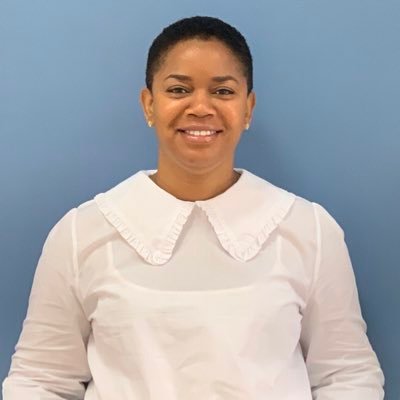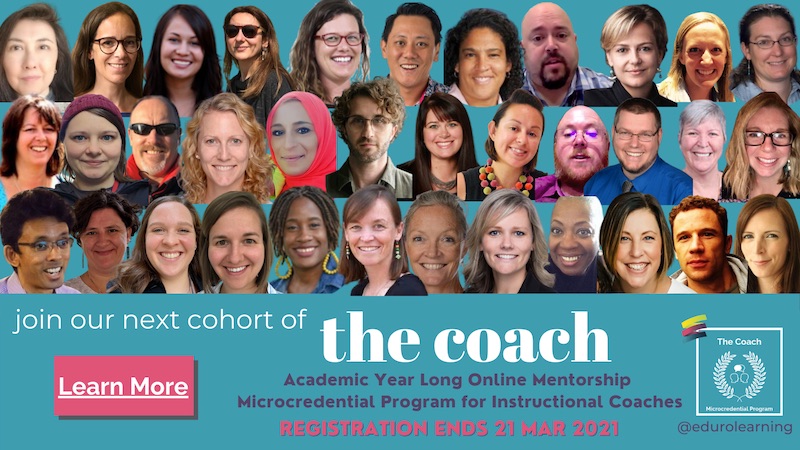In this second episode in our short series on Coaching in Practice for #coachbetter, where we chat with coaches and their coachees to better understand the complexities of building coaching relationships, Kim is chatting with Aaron Shelby and Sasha Robins. Aaron was Sasha’s first instructional coach and inspired her to become a coach herself. They talk about the process of building their coaching relationship, what it felt like from both sides, and the outcome of their work together. They end with a reflection on the value of coaching in schools – from both the coach and coachee perspective. If you want to get a better understanding of how coaches and coachees work together – and the long term impact of that work – this conversation is for you!
Subscribe to #coachbetter via your favorite Podcast Player!
Featured Guests
Bonus! Watch the Spotlight Version on YouTube!
Show Notes
This Episode’s Guests
Sasha: at Al Bayan Bilingual School in Kuwait, came as a teacher of English. Have been teaching for over 20 years. Always taught High School. Hillel Academy in Jamaica.
Aaron: 6 years in Kuwait, High School Humanities. Public school teacher in NYC. 9th grade government in downtown Brooklyn. Currently at American Community School in Abu Dhabi.
Aaron, as a coach, how did you approach and develop your relationshiop with Sasha? What did that feel like for you Sasha?
Aaron: During orientation week, Sasha approached me. Coaching intro at Teaching & Learning Center. First few weeks, didn’t want to overwhelm. Let them know we’re there to support, basic check ins. Focused on relationship building, before diving into some more coaching.
Sasha: now that Aaron is sharing it, it didn’t feel inauthentic, I didn’t realize it was relationship building. He seemed authentic and it seemed easy. One day he asked if he could observe in the classroom. I was nervous and felt very vulnerable and self-conscious. The questioning he did after allowed me to think and start to reflect on some of the things I was doing in the classroom. Then he asked if he could video record, another moment of video recording. It didn’t feel as stressful or overwhelming as I thought it could be, because he was always asking questions. I thought he was going to tell me.
Aaron: I also felt nervous and vulnerable, because you don’t know if the teacher has the perception that “I’m going to come in and “solve this problem”. You never know their expectations, this is part of the ongoing work. I’m not here to have all the answers. You’re not expected to have all the answers either. We’ll work on it together. We are partners. I don’t want people to feel like I’m imposing things on them. They have the freedom and flexibility to see how they’re going to get closer to their student goals.
How did you work together? What was the process like?
Aaron: school had a whole model / framework for instructional coaching. What do you see your needs are within this relationship? From there, “thinking about the nature of the classroom, it’s getting into the classroom”. How can I do that: more naive statements “hey, I heard this awesome thing was happening in your classroom, can I come take a look?” “do you know anything about this? Can I come in and see?” to get in the classroom. Thought partner in conversation, but as the coach, knowing what is going to be appropriate at that time based on the level of the relationship.
Aaron: first year was very relationship driven, teacher centered, second year more student centered, last year was more student centered, and understanding that we’re setting student goals and that means your own practice will be affected. What are our student goals and how do we get students there.
Sasha: You don’t realize whats happening behind the scenes. Now that I have to do it, I realize what he was doing. He always appeared confident. Sometimes I would dread our conversations, because I knew he would always push me out of my comfort zone. It was not that I didn’t trust him, it was because I didn’t know where it would go. Looking back, I realize how much I value the relationship and how much I learned from that. It felt good, a good stretching of self. I realize that it’s my character that’s growing and my teaching is improving, and I’m becoming a better person.
How did the relationship develop? What was the outcome?
Sasha: He would come to the class and do video taping, share it with me, and talk about what we’d seen. The questions he asked were about the situation. Just by asking a question, he would inspire my brain in lots of ways. Initial dread was that he might see that I’m not a great teacher. Once I put that aside, it was more about what he would ask me today – what would I have to think about and not have the answer. Even if I didn’t have the answer, he would always be able to lead me to have another thought. He never told me his opinion, he would show me the data and give me something I could not ignore. He was always asking more questions
What did you learn from this experience that would be relevant for other coaches and teachers?
Aaron: it comes down to questions and student evidence. During our first year working together, I remember a pivotal conversation. I remember leaving that conversation thinking “this was my first true difficult conversation” – not about how things were said but how they were received looking at data. Data doesn’t lie, that might have been the first experience that teachers have had authentic conversations based on the parameters that the coach & teacher have set, referring to the data. Realizing that these are people too, just because you have a plan and a relationship, doesn’t mean every conversation will be easy. Really to check in as human and be in that moment, and how can we move forward from here in a supportive way.
Aaron: for teachers, don’t be afraid of the evidence you’re receiving. It doesn’t reflect on you, how can you take that reality and move forward from here.
Sasha: At a certain point, we started looking at student evidence, and I was worried it would be a bad reflection on me. It was difficult to see the evidence on paper, you can’t deny it. There’s no two ways around it. I had to decide, this isn’t great, and realize that it revealed some things I wasn’t aware of. That was a hurdle I had to overcome. I think Aaron realized I wasn’t ready to deal with it yet. His questions helped me realize that my teaching isn’t not about me, it’s about the students. I have a responsibility for them. You have good intentions, and then you have data that shows you what the reality is. The language he used: “this is not an indictment, I don’t know any more than you, we’re going to work on this together”
Aaron: 3 outcomes: 1) student engagement: really being specific and intentionally about what we’re doing in the classroom, and seeing student improvement around the goals that we set. I saw excitement from Sasha as a teacher 2) my own outcomes, being able to try so many different coaching approaches and stances; 3) now Sasha is a coach, now she is the living breathing full embodiment of her own journey and how she’s passing this along to the teachers she’s working with.
Sasha: 3 outcomes: 1) feeling empowered as a teacher, things you can actually do to track progress, became very clear that when I work as a coach I want it to be that all parties involved are empowered – he showed me that there’s so much more to growing, re-energize that spark to grow more; 2) where I am now as a coach, is where I want to be. If I hadn’t seen Aaron work, I wouldn’t have an idea of what I want to do. I realize that I have my own way, it’s not the intention to recreate Aarons’ way, I have something else to contribute.
Why is coaching so valuable in the education profession and how can schools make coaching a priority?
Sasha: Coaching is everything. We go to all these PDs, and they’re great, but half the time you get caught up in all these things that have to be done, you push that PD to the side. Because coaching is tailored to you and your kids, you have the ability to make a difference right now. Because it’s a 1:1 partnership, you have an accountability partner. Schools should make it a priority. Admin teams have to understand what coaching is and what value it brings, it can not be replaced by going to a PD for a day. If we have instructional leaders, who have benefited from coaching.
Aaron: If you’ve had a powerful coaching experience, you can really understand how much impact that can have on you individually. “Not only has this helped me think about my role in a different way, but it has bled into my personal life and I’ve seen great positive outcomes from that” Nobody knows everything about everything. Once we understand that, how do we collaborate and partner with the work. Has to be about the students. What do we need to know and do and understand about our student population to help them get where they need to go. Coaching is job embedded PD to help get students were they need to be. Coaching is essential to the benefit of teacher and ultimately the student development within the at community.








Recent Comments